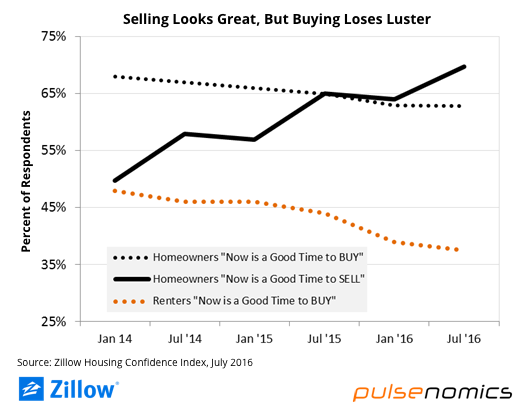Zillow Housing Confidence Index: Homeowners Got Swagger, But Buyers Increasingly Discouraged
Homeowners have a lot of swagger in today’s market, and for good reason – home values are rising, demand is high and homes are selling very quickly. But the same trends helping to buoy homeowner confidence are also proving increasingly discouraging for potential buyers, particularly among current renters, a critical imbalance that could have important impacts on the market going forward.
- Homeowners are confident about the current state of the housing market, and the majority believe now is a good time to sell a home.
- Renters are less confident than homeowners, with only 37 percent confident that they will be able to afford a home in the future.
- The most confident homeowners are concentrated in Western and Southwestern cities, like Seattle and Dallas, which also have the least confident renters.
- Overall U.S. housing confidence inched up in July to 67.3, up 0.4 from January 2016.
Homeowners have a lot of swagger in today’s market, and for good reason – home values are rising, demand is high and homes are selling very quickly. But the same trends helping to buoy homeowner confidence are also proving increasingly discouraging for potential buyers, particularly among current renters, a critical imbalance that could have important impacts on the market going forward.
Additionally, while overall confidence in the housing market is up nationwide, several indicators point to fading confidence in a number of large markets – particularly the most expensive and/or fastest-growing markets, according to the July 2016 Zillow Housing Confidence Index.
The semi-annual Zillow Housing Confidence Index, sponsored by Zillow and calculated by Pulsenomics LLC, is calculated for the U.S. as a whole and 20 large metro markets nationwide. It is based on a national survey of 10,000 American renters and homeowners.[1] Overall U.S. housing confidence inched up in July to 67.3, up 0.4 from January 2016 and up 0.8 percent from the same time a year ago.[2]
The ZHCI is composed of three sub-indexes: The Housing Market Conditions Index summarizes homeowner and renter assessments of current market conditions; the Housing Expectations Index measures their expectations regarding future home values and affordability; and the Homeownership Aspirations Index that gauges aspirations and attitudes regarding homeownership. In July, all three sub-indexes rose from a year ago, helping push headline confidence higher.
Confidence Varies Among Renters & Homeowners, Buyers & Sellers
But while confidence in general was up, that optimism was not shared equally between the roughly 63 percent of American households that own a home, versus the remainder that rent their home. U.S. homeowner confidence rose to an index level of 71.3 in July, up 1 point from January and 1.7 points from a year ago. At the same time, confidence among American renters fell to a level of 61.2 in July, down 0.3 points from January and 0.6 points from last summer. The 10.1-point gap between homeowners’ confidence levels and renters’ confidence levels is the largest recorded since publication of ZHCI began in January 2014.
At the metro level, the gap in confidence between homeowners and renters was smallest in Miami and largest in Seattle – the market with the highest year-over-year rent appreciation of the 35 largest U.S. metros and very rapidly rising home values, up 11 percent over the past year.
 This confidence gap can be clearly seen in the share of homeowners who say it’s a good time to sell, and renters saying it’s a good (or, in this case, bad) time to buy. At the beginning of 2014, the share of homeowners saying it was a good time to sell (50 percent) was roughly on par with the share of renters saying it was a good time to buy (48 percent). Fast-forward to today, and 70 percent of homeowners say it’s a good time to sell, compared to just 38 percent of renters saying it’s a good time to buy.
This confidence gap can be clearly seen in the share of homeowners who say it’s a good time to sell, and renters saying it’s a good (or, in this case, bad) time to buy. At the beginning of 2014, the share of homeowners saying it was a good time to sell (50 percent) was roughly on par with the share of renters saying it was a good time to buy (48 percent). Fast-forward to today, and 70 percent of homeowners say it’s a good time to sell, compared to just 38 percent of renters saying it’s a good time to buy.
Of the 20 metro areas analyzed as part of the ZHCI, this gap is widest in San Francisco (73 percent of homeowners think it’s a good time to sell, versus 13 percent of renters saying it’s a good time to buy), and narrowest in Chicago (52 percent of owners say it’s a good time to sell, 47 percent of renters say it’s a good time to buy).
That these two markets in particular show the largest and narrowest gaps is telling: San Francisco has been among the fastest-growing markets in the country over the past few years. Local homeowners have likely seen big gains in wealth as their homes have appreciated – to the detriment of renters that may feel as though they can’t catch up to the market and save enough to buy. Chicago has been one of the slower-growing markets nationwide, and has a large amount of negative equity left over from the recession – and negative equity can prevent homeowners from selling, even if they want to. But the slower-moving market may be leading more renters to feel they could buy a home if they want to – while it hasn’t grown much, the share of renters saying it’s a good time to buy also hasn’t fallen much in Chicago, either, staying largely flat for the past year.
Finally, a reason that many renters may be signaling it’s a tough time to buy is because of rising prices themselves and the impact that is having on affordability – an issue only likely to get worse if and when today’s ultra-low mortgage interest rates begin rising. Home values are currently at or past peak levels in roughly a quarter of U.S. markets. In other words, homes have never been more expensive in those places. This is hurting renter confidence in a number of larger markets. About half of current renters in San Francisco and New York expressed a lack of confidence in their ability to afford a home in the future. Almost half of the renters surveyed in Seattle, San Jose and Boston had similar feelings.
Musical Chairs
But not every would-be buyer is currently renting – current homeowners also represent a good source of buyers. And while this group thinks it’s a great time to sell, increasingly these homeowners, too, don’t think it’s a good time to buy. Currently, 63 percent of homeowners surveyed said now is a good time to buy – a large portion, yes, but a number that’s been declining steadily for the past two years.
This trend is important, of course, because for any home transaction to occur there needs to be both a buyer and a seller. And if buyers don’t think it’s a particularly good time to buy, they may decide to hold off on entering the market altogether until they see buying conditions improve.
Interestingly, many of these current homeowners may actually be contributing to some of the very conditions leading so many Americans to say it’s a bad time to buy. A big driver of the rapid price gains and fast-moving markets we’re seeing is incredibly low inventory of homes for sale. Fairly anemic building activity is contributing to a lot of this inventory shortage, but there’s also a “musical chairs” aspect at play. A large majority of homeowners think it’s a great time to sell, but for whatever reason, are not actually listing their home for sale. Looking at the data, we can infer that this may be related to the shrinking share who think it’s a good time to buy. A growing number of homeowners may be worried that once they sell, they’ll need to turn around and buy again – and buying in a low-inventory, fast-moving, rapidly appreciating market isn’t much fun. Essentially, they’re reluctant to stand up from the chair/home they’re in, lest they find themselves without a different one to sit back down on/move into once the music stops.
Outlook
The overall health of the housing market looks great at first glance – over the past two years, overall housing confidence has increased in all but two of the metro areas studied. But dig a bit deeper and you’ll find inequality between renters and homeowners. Even though the majority of homeowners are confident and believe now is a good time to sell, they’re holding off because they expect home values to continue to appreciate and want to ride the wave. They also don’t want to turn around and become buyers in a competitive market. On the flip side, renters aren’t nearly as confident as homeowners – they’re discouraged by the shrinking number of homes for sale and rapidly rising prices. As housing gets more expensive, these trends are not sustainable in the long-run, especially once mortgage rates start to rise. We’re likely to start seeing weakening confidence and/or faltering home value appreciation if these imbalances persist.
[1] The ZHCI summarizes more than 300,000 data points collected from questionnaires completed by 10,000 heads of household across the country as part of the semi-annual U.S. Housing Confidence Survey.
[2] The Zillow Housing Confidence Index and all sub-indices are calculated on a 100-point scale, with readings above 50 indicating generally positive views and readings below 50 indicating largely negative views.

